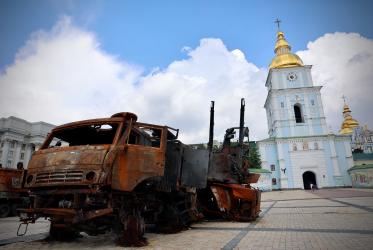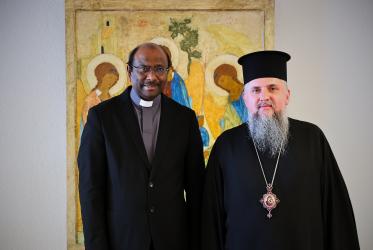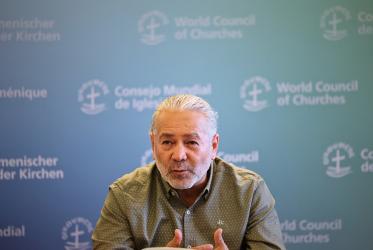WCC deputy general secretary Prof. Dr Isabel Apawo Phiri said she saw a confirmation of what we have been taught before: that churches are usually the first responders to any crisis in the world. “What I’ve also seen is the people are emphasizing the fact that we belong to the same faith, and we are the same people, so they are looking at the Ukrainians as one of them,” she said. “You see people treating the refugees with so much respect.”
As churches help refugees, they give people the impression that they are responding as people of faith. “I’m seeing the Christ in you, the image of God in you, and I treat you with dignity,” said Phiri, who also expressed special concern for black people in Ukraine who are also trying to flee from the war.
“There are many migrants who are not Ukrainians and who need help,” she said.
Peter Prove, WCC director of international affairs, said that the war in Ukraine is a major geo-political challenge for the region and for the world. “But of course the first and most important issue is the human impact of this conflict and the consequences for women, men and children who are fleeing from this crisis,” he said. “And here in Romania, and in Hungary, we have seen an extraordinary welcome, and an extraordinary hospitality” from churches, aid groups and others who are helping. “This is really what we want to affirm,” said Prove.
Elena Timofticiuc, executive director of AIDRom, said she was impressed with how the church reacted immediately. “For me, I think our objective is to bring together churches to work in a diaconal way,” she said, adding that the hardest period of response may be yet to come.
“Until now, Romania was more or less a transit country but now we have signals that a lot of people have chosen to remain in Romania,” said Timofticiuc.
A rising challenge is trying to find accommodations for refugee families, she said. “They are mainly women and children, and so vulnerable persons,” she said.
Rudelmar Bueno de Faria, ACT Alliance general secretary, said that the group saw firsthand the terrible effect the war is having on people, communities and families. “But we also saw a lot of solidarity, engagement and support from people affected by this disaster,” he said. “We saw how churches have been engaging from the first day.”
Faith-based groups and churches can make an immediate difference, de Faria added. “It’s amazing the effectiveness of the work—coordinating with the different actors not only promoting their own identity but working together for the sake of the people,” he said, adding that advocacy and peace-building are also vital functions of churches.
Thorsten Göbel, ACT Alliance director of programs, expressed how inspired he was by the strong local response from churches. He noted that the refugees often have a great need for information about where to get help, or legal aid. “That is something ACT members are enabling already,” he said.
Accommodations will be an issue down the line, he said. “I also see a rising need for spiritual and psycho-social support,” he said.
Zota Ionut Lucian, a social worker with AIDRom, agreed with Göbel that, currently, people are most in need of information.
“They need to know where to stay here for a few days, or how to get to western countries,” said Lucian. “Some of them need help to find a job, to find food,” he said. “They are happy to receive hope but you don’t solve their problems—their minds and their hearts are over there, in Ukraine.”
Photos of the solidarity visit by ACT Alliance and WCC
ACT Alliance, WCC delegation visits Hungary, Ukraine and Romania with a focus on humanitarian needs, church response (WCC press release of 18 March 2022)
Churches respond to growing humanitarian needs in Ukraine and bordering countries (WCC news release, 11 March 2022)
WCC appalled by escalating impact on civilians of conflict in Ukraine (WCC news release, 11 March 2022)
Patriarch Kirill responds to WCC acting general secretary’s letter urging voice for peace (WCC news release, 10 March 2022)
WCC acting general secretary to Patriarch Kirill of Moscow: “raise up your voice so that the war can be stopped” (WCC press release, 2 March 2022)
WCC urges President Putin to stop war, restore peace to Ukraine (WCC press release of 25 February 2022)







